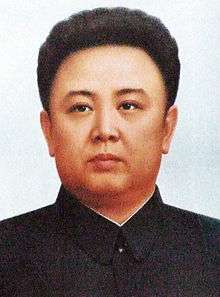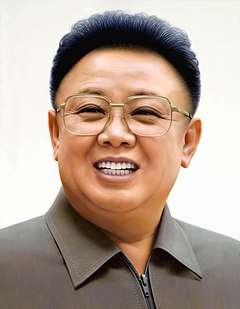Kim Jong-il bibliography
Kim Jong-il (16 February 1941/1942 – 17 December 2011) was the Supreme Leader of North Korea from 1994 to 2011.
 Kim Jong-il | |
| Complete Collection↙ | 13 |
|---|---|
| Selected Works↙ | 24 |
| References and footnotes | |
According to North Korean sources, Kim Jong-il published some 890 works during a period of his career from June 1964 to June 1994.[1] According to the Korean Central News Agency (KCNA), the number of works from 1964 to 2001 was 550.[2] In 2000, it was reported that the Workers' Party of Korea Publishing House has published at least 120 works by Kim.[3] In 2009, KCNA put the numbers as follows:
At least 354,000 copies of [Kim Jong-il's works] were translated into nearly 70 languages and came off the press in about 80 countries in the new century. There were more than 500 activities for studying and distributing the works in at least 120 countries and regions in 2006. The following year witnessed a total of more than 600 events of diverse forms in at least 130 countries and regions. And 2008 saw at least 3,000 functions held in over 150 countries and regions for the same purpose.[4]
Two collections exist, the Selected Works of Kim Jong-il and the Complete Collection of Kim Jong-il's Works. Both are full of forged works that Kim never wrote, included to give readers the impression that he was working with ideologically formulating the Juche idea in his youth. In reality, Kim only sporadically talked about the topic. When he did, mentions were typically backdated. For instance,[5] a speech published in 1984 called On Some Questions in Understanding the Juche Philosophy is dated 1974 and contains a plea that "it would be advisable not to publish my talk for the present"[6] in an effort to explain why it hadn't been published immediately.[5]
The Selected Works of Kim Jong-il (Enlarged Edition), whose publishing has continued posthumously, runs into volume 24 in Korean,[7] and to volume 15 in English.[8] Volumes three to eight were never published in English.[9] The fact that new volumes are being added in such a peculiar order testifies to the fact that it takes time to forge works in the "early" volumes. On the other hand, it could also be an indication that the project is not a priority for the North Korean regime.[10]
The Complete Collection of Kim Jong-il's Works is currently in volume 13.[11] The earliest work in this collection is from July 1952, when Kim would have been only 11 years old.[12][5]
Kim Jong-il did not enjoy speaking in public. That is why he chose to break with the tradition of New Year addresses delivered to live audiences that his father had. During Kim Jong-il's rule, New Year addresses were always published jointly in three newspapers – Rodong Sinmun, Joson Inmingun, and Chongnyon Jonwi – instead.[13]
There is a "Kim Jong-il's Works Exhibition House" dedicated to his works in North Korea, holding 1,100 of his works and manuscripts.[14]
In his teens and university years, Kim Jong-il wrote poems – notably "O Korea, I will Add Glory to Thee".[15] Kim Jong-il also wrote song lyrics.[16]
Kim wrote particularly much on the arts. For instance 22 out of 46 works in volume one of his Selected Works (1964-1969) are on the topic.[17] His first truly major literary work was also on the theme, On the Art of the Cinema (1973).[18]
Bibliography
| Year | Title | Notes |
|---|---|---|
| 1970 | Let us Create more Revolutionary Films Based on Socialist Life | |
| 1973 | On the Art of the Cinema | |
| 1974 | On Some Questions in Understanding the Juche Philosophy | |
| 1981 | On Further Improving Party Ideological Work | |
| 1982 | On the Juche Idea | |
| 1983 | Let us Advance under the Banner of Marxism-Leninism and the Juche Idea | |
| 1984 | On Further Improving the Work of the Trade Unions | |
| 1985 | On the Further Improvement of the Health Service | |
| 1986 | Let us Step up the Three-Revolution Red Flag Movement | |
| 1986 | Life and Literature | |
| 1987 | On Establishing the Juche Outlook on the Revolution | |
| 1987 | The Cinema and Directing | |
| 1988 | The Present Times and the Tasks Facing Young People | |
| 1990 | On Having a Correct Viewpoint and Understanding of the Juche Philosophy | |
| 1990 | On Some Problems of the Ideological Foundation of Socialism | |
| 1990 | Socialism of our Country is a Socialism of our Style as the Embodiment of the Juche Idea | |
| 1991 | Our Socialism Centred on the Masses Shall not Perish | |
| 1992 | Socialism is the Life of our People | |
| 1993 | Abuses of Socialism are Intolerable | |
| 1994 | Socialism is a Science | |
| 1995 | Giving Priority to Ideological Work is Essential for Accomplishing Socialism | |
| 1995 | The Workers' Party of Korea is the Party of the Great Leader Comrade Kim Il Sung | |
| 1996 | Respecting the Forerunners of the Revolution is a Noble Moral Obligation of Revolutionaries | |
| 1996 | The Juche Philosophy is an Original Revolutionary Philosophy | |
| 1996 | Let us Exalt the Brilliance of Comrade Kim Il Sung's Idea on the Youth Movement and the Achievements Made Under his Leadership | |
| 1997 | On Preserving the Juche Character and National Character of the Revolution and Construction | |
| 1997 | Let us Carry out the Great Leader Comrade Kim Il Sung's Instructions for National Reunification |
See also
- Juche
- Pulgasari, a motion picture epic produced by Kim Jong-il
- Kim Il-sung bibliography
- Kim Jong-un bibliography
- Marxist bibliography
References
- "1. A Great Thinker and Theoretician". naenara.com.kp. May 2008. Retrieved 11 December 2015.
- "Over 530 works of Kim Jong Il published". KCNA. 8 June 2001. Archived from the original on 12 October 2014. Retrieved 6 May 2016.
- "Over 120 works of Kim Jong Il brought out". web.archive.org. KCNA. 26 December 2000. Archived from the original on 12 October 2014. Retrieved 29 February 2016.
- "Kim Jong Il Authors Lots of Works". KCNA. 25 August 2009. Archived from the original on 12 October 2014. Retrieved 6 May 2016.
- Myers 2015, p. 170.
- Kim 1985, p. 6.
- "'Selected Works of Kim Jong Il' (Enlarged Edition) Vol. 24 Off Press". KCNA. 22 November 2014. Archived from the original on 8 January 2016. Retrieved 6 March 2016.
- Korea Publications Exchange Association catalogue (PDF). Korea Publications Exchange Association. 2015. p. [27]. Archived from the original (PDF) on 2 April 2017. Retrieved 6 May 2016.
- "Selected Works". north-korea-books.com. Archived from the original on 30 April 2016. Retrieved 6 May 2016.
- Myers 2015, p. 188.
- "'Complete Collection of Kim Jong Il's Works' Vol. 13 Published". Rodong Sinmun. 6 May 2016. Archived from the original on 13 May 2016. Retrieved 6 May 2016.
- "Vol. 1 of 'Complete Collection of Kim Jong Il's Works' Off Press". KCNA. 15 February 2012. Archived from the original on 8 September 2017.
- Tertitskiy, Fyodor (29 December 2017). "How to interpret Kim Jong Un's New Year's address". NK News. Retrieved 17 October 2018.
- "Service Personnel, People Visit Kim Jong Il's Works Exhibition House". KCNA. 18 February 2015. Archived from the original on 8 September 2017. Retrieved 6 March 2016.
- "23. Leader Kim Jong Il, genius of literature and art". naenara.com.kp. March 2010. Retrieved 11 December 2015.
- "Song lyrics by Kim Jong Il". naenara.com.kp. Retrieved 11 February 2016.
- Kalder, Daniel (2018). The Infernal Library: On Dictators, the Books They Wrote, and Other Catastrophes of Literacy. New York: Henry Holt and Company. p. 287. ISBN 978-1-62779-343-8.
- Jae-Cheon Lim (2015). Leader Symbols and Personality Cult in North Korea: The Leader State. Routledge. p. 28. ISBN 978-1-317-56741-7.
Works cited
- Kim Jong-il (1985). "On Some Questions in Understanding the Juche Philosophy: Talk to Theoretical Propagandists of the Party, April 2, 1974". On the Juche Idea of Our Party. Pyongyang: Foreign Languages Publishing House. pp. 1–6. OCLC 469424334.
- Myers, B. R. (2015). North Korea's Juche Myth. Busan: Sthele Press. ISBN 978-1-5087-9993-1.CS1 maint: ref=harv (link)
External links
| Library resources |
| By Kim Jong-il |
|---|
- Works of Kim Jong-il at Publications of the DPRK
- Books and articles at Korean Friendship Association
- Audio excerpts at Voice of Korea
- Kim Jong-il at the Marxists Internet Archive (in Spanish)

